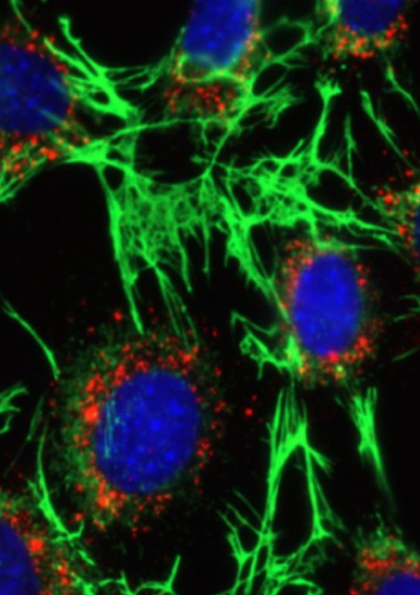
cell-cell communication by signaling
All of us begin as fertilized eggs—a single cell.
One of the biggest mysteries of biology is how one single cell automatically follows a path of repeated cell division, to give rise to complex patterned organisms. What clues do we have for solving this massive mystery? Scientists believe that the clue lies in the following two facts. First, the fertilized egg is the lone source of DNA that the billions of cells will eventually inherit. In the organism that grows from this fertilized egg—all it’s different organs and tissue types inherit the same DNA—yet they have very distinct cellular identities and functions. Second, no two cells of different types can occupy the same location in a complex body at the same time. A skin cell does not normally belong in the liver, for example. Even within the skin, the outer layer is different from the inner layers. At a macro as well as a micro level, order gives rise to the form. It follows that depending on the location and neighborhood of a cell, the same DNA can function differently and yield different cellular identities.
The ability of our cells to put to use their DNA in a multitude of different ways is an area of research at the limits of our understanding of biology. Apparently, genetically identical cells (same DNA sequence) function differently because some mechanisms override the genetics. These mechanisms are collectively studied under the umbrella area of ‘epigenetics’ (epi = overriding, genetics = inheritance). A simple statement reflects the current understanding as follows: all our cells are genetically same but epigenetically different.
The effects of the cellular neighborhood on the epigenetic states of cells is the next big step in cell and molecular biology. Signals from neighboring cells coming in the form of hormones, secreted biochemical agents, and even the physical pressure exerted by the neighboring cells, together constitute the signals that affect a cell’s epigenotype. Going back to the example of the skin, this process is exhibited by the cells neighboring a site of injury on the skin. The signals emanating from the cells flanking a site of wound enable some target cells to change their identity resulting in the process of healing.
It is in response to these external factors that a cell makes short-term decisions of stress response, programmed cellular suicide and cell division, as well as, long-term decisions such as, remaining a stem cell or not, becoming a neutron, a skin cell or some other cell type. Apparently, the signals from the cellular neighborhood culminate in the recipient cell nucleus to change its epigenotype. This process of sensing the signals by a cell, transmitting it to the nucleus and affecting the epigenotype is critical to ensuring that the cells maintain a tissue structure order.
A breakdown of this system causes cancer amongst other diseases. Understanding the interface of external signals, how a cell deals with it and how does it affect the cellular fate epigenetically is the cornerstone of understanding cell biology. This knowledge will allow us to understand the basics of how we develop as an embryo from one stem cell to a cocktail of differentiated cells and, why some cells form tumors and metastasize.
My research in the past has shown that a factor called TFG-beta plays an important role in cancer by signaling the cells to undergo programmed cell death as well as induce them to migrate. Another area of my research has been the epigenetic mechanisms and their effects on how a cell packs, unpacks and uses its DNA. At Ahmedabad University, my research group aims to study the interface of these two phenomena; how do the signals from TGF-beta affect a cells epigenotype.
My research has spanned across epigenetics and intercellular communication by signal transduction (Google Scholar link). At Ahmedabad University, I have hybridised these two hitherto separate areas of research into one. In addition, I depend on my research experience in these areas to enrich my teaching. I have taught a diverse set of topics including, Immunology, Biochemistry, Animal Biotechnology, Cell Biology and Epigenetics. The open approach at Ahmedabad University allowed me to approach Epigenetics from a unique perspective to introduce it to non-bio students as well. The impact of these lessons of molecular inheritance, cellular identity and organismal organisation extend beyond Biology. I have borrowed these concepts to frame my approach to teach some of the most challenging and interesting topics, including ‘Democracy and Justice’ to our incoming students as a part of the Foundation Programme. My research allows me to dig deep into the molecular bases of our being, and yet enables me to draw concepts from it to teach and develop the future outlook of my students beyond what has been the convention.


